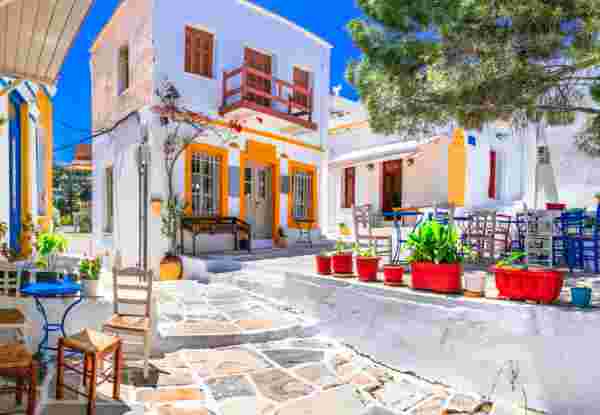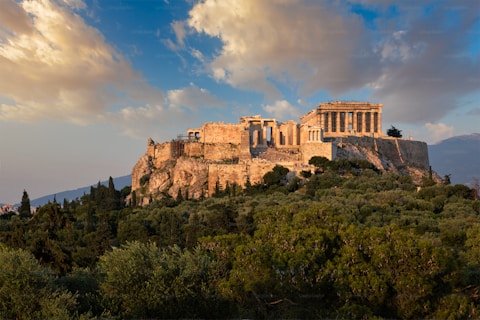Christmas in Greece: Festive Traditions and Celebrations
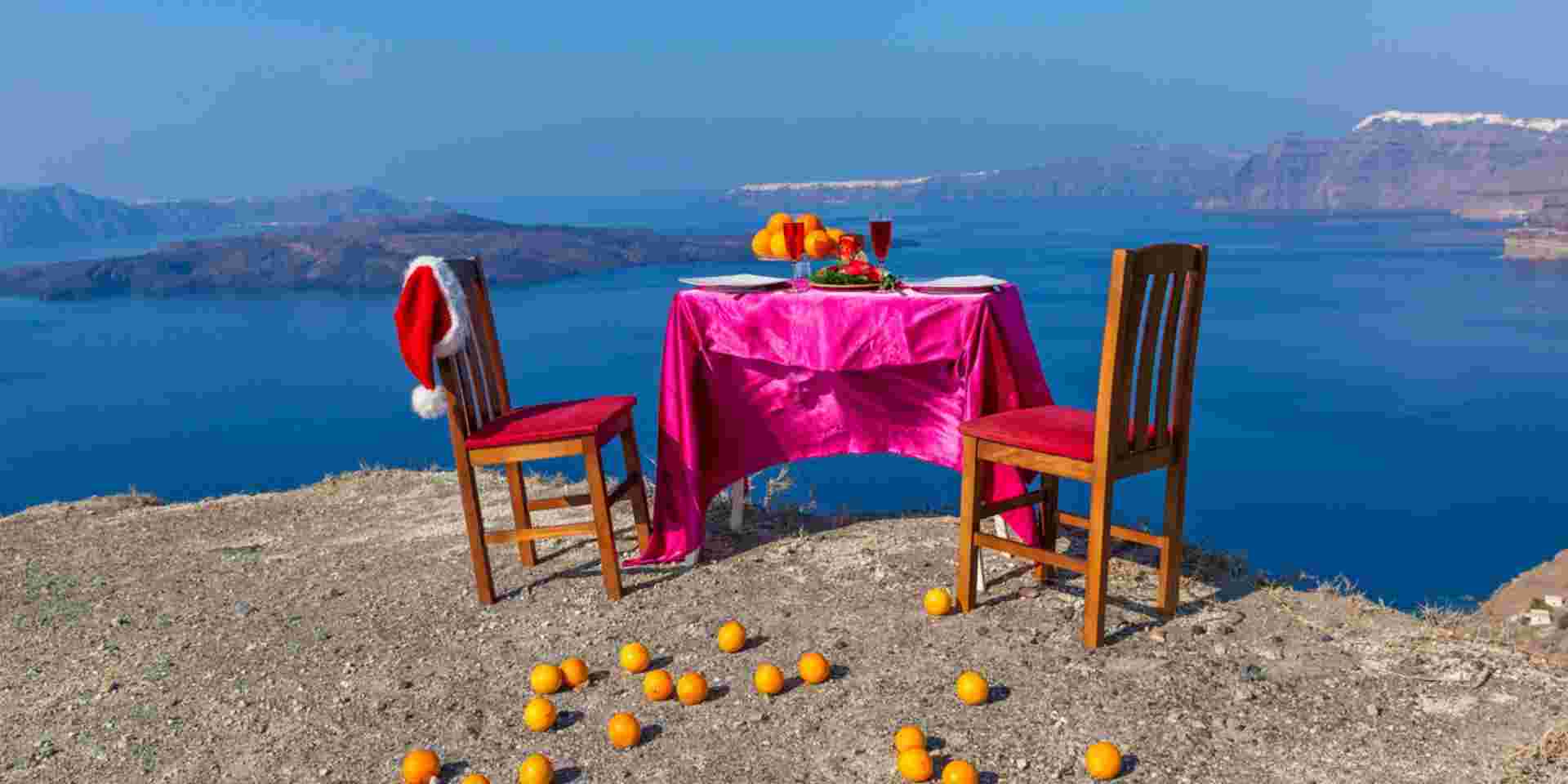
Embrace the magic of the holiday season in Greece. Many old Greek traditions mix with the warmth of the Orthodox faith. Christmas in Greece is more than just a festive time. It is a time for family, faith, and special customs that have been shared for many years. Get ready to be charmed by the sights, sounds, and tastes that make this time of year so special in Greece.
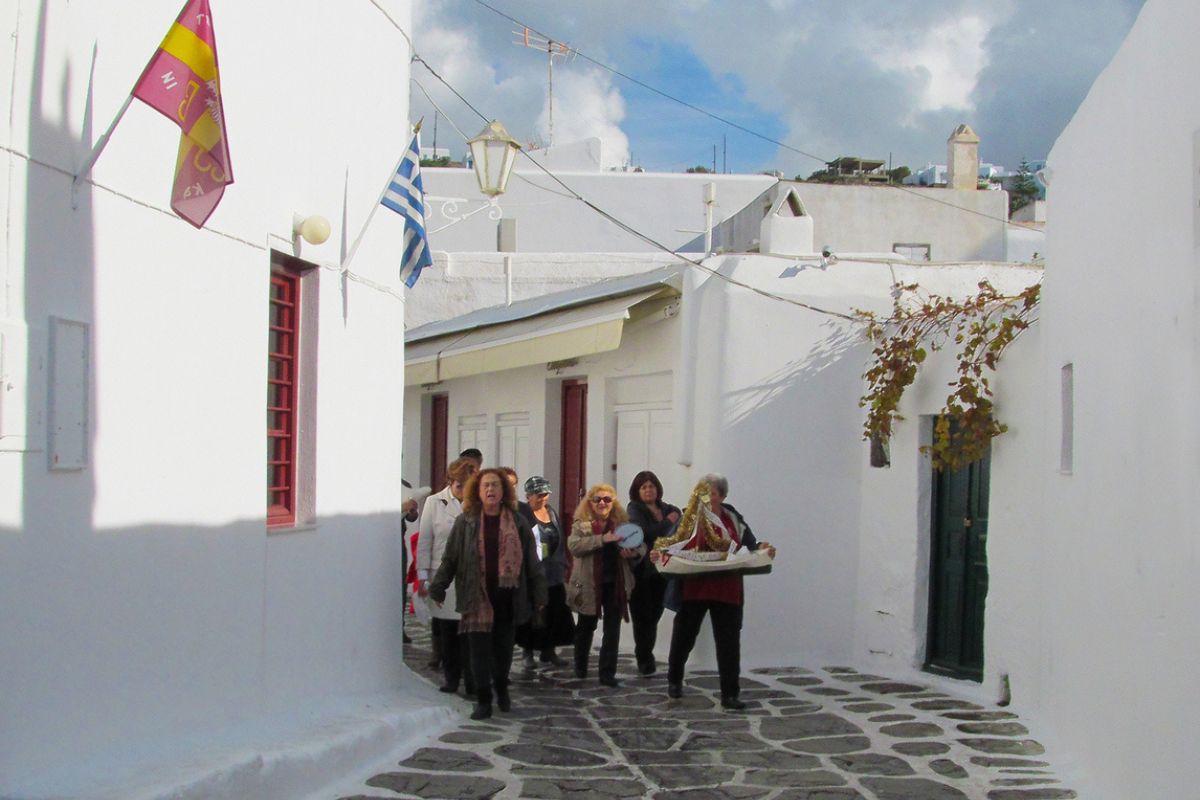
Greek Christmas Traditions
Christmas in Greece is a lovely mix of old traditions and religious celebrations. Although shiny Christmas trees are common now, you can still see the old practice of decorating boats (Karavaki). This honors Greece’s deep connection to the sea and Saint Nicholas, the saint who protects sailors.
Children go door-to-door singing Kalanda. These are traditional Christmas songs. They fill the air with happy tunes and stories about Christ’s birth. This practice comes from Greek culture. It shows the warmth and community feel that fills the Christmas season.
The Importance of Agios Vasilis – Greece’s Take on Santa Claus
In Greece, the cheerful character spreading Christmas joy is Agios Vasilis, the Greek version of Santa Claus. He looks like Santa Claus from the North Pole, but Agios Vasilis, also called Saint Basil the Great, is special in Greek culture. He is known for his kindness and is celebrated on January 1st. This is why many Greek kids get their gifts on New Year’s Day.
This tradition comes from the Orthodox calendar and the importance of Saint Basil’s Day. In recent years, many families have chosen to exchange gifts on December 25th. This aligns with how people celebrate Christmas around the world.
Many lucky children in Greece get to feel the joy of receiving gifts on Christmas Day and Saint Basil’s Day!
The Special Tradition of Karavaki – Christmas Decorations by the Sea
One of the best parts of a Greek Christmas is the tradition of Karavaki, the lovely decorated Christmas boats. These small boat decorations, often lit up with blinking lights, can be seen in Greek homes and public areas during the holidays. Unlike the newer trend of using Christmas trees, Karavaki have strong ties to Greek culture. They represent the rich history of the sea and the country’s close ties to it.
The tradition of decorating boats for Christmas goes back several centuries. It shows how important the sea has been in Greek life. People thought that this practice would bring good luck to sailors and fishermen. This would help them return home safely for the holidays.
Today, Karavaki is still a cherished symbol of Christmas in Greece. It stands for hope, good luck, and the lasting link between the Greek people and the sea.
Kalanda: The Heartwarming Greek Christmas Carols
As the Christmas season brings joy, the sound of Kalanda, the traditional Greek Christmas songs, fills the streets and homes in Greece. Early in the morning, groups of kids often hold triangles and tambourines. They take part in a warm tradition of singing carols and spreading happiness. They go from door to door, singing Kalanda, which talks about Christ’s birth and other Christmas stories.
The tradition of Kalanda is important in Greek culture. It brings people together during Christmas time. It’s exciting to see the happiness and energy coming from the young carolers. They share their joyful spirit with every home they visit.
Homeowners often show their thanks for the children’s joyful songs. They usually give them sweets, small gifts, or even some money. This makes the Greek Christmas tradition feel even more special.
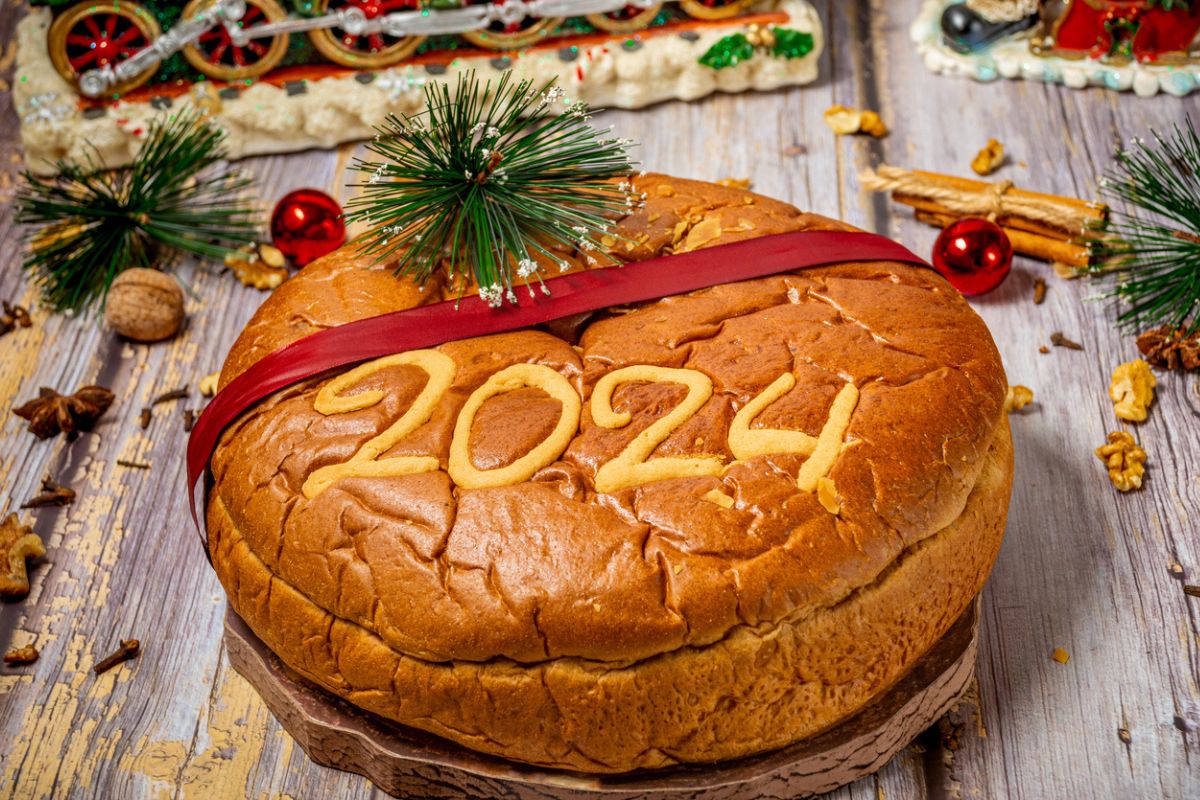
Greek Christmas Food
Christmas in Greece is a time to enjoy many traditional dishes. These meals often include tasty meats, fragrant bread, and sweets that just melt in your mouth. The holiday table is filled with items like tender roast pork, flavorful stuffed turkey, and Christopsomo, which is a sweet bread. This bread means good luck and wealth.
But no Greek Christmas feast is complete without a big mix of sweets. Enjoy the honey-soaked Melomakarona cookies topped with lots of nuts. Or try the soft Kourabiedes almond cookies covered in powdered sugar.
Christopsomo: The Sacred Bread of Christmas
No Greek Christmas table is complete without Christopsomo. This sweet bread is very important during the holiday season. The name means “Christ’s bread,” which shows how special it is for Christmas. Made carefully, Christopsomo is not only a tasty treat. It also stands for good luck, thriving, and the blessings that come with the birth of Jesus.
This round loaf is easy to spot because of its special design. A cross made from dough is usually in the middle. Sometimes, nuts or almonds sit on top, showing wealth and plenty. As Christopsomo bakes in the oven, its smell makes homes feel warm and helps people look forward to the coming celebrations.
During Christmas Eve dinner, the head of the family usually cuts the Christopsomo. This bread is then shared among family and friends. It shows unity, blessings, and gratitude during this special time.
Melomakarona and Kourabiedes: Important Greek Christmas Treats
Get ready for the sweet taste of Melomakarona and Kourabiedes. These are two famous Greek Christmas treats that have the rich flavors of the holiday. Melomakarona are soft, chewy cookies soaked in honey syrup. They are a true treat for anyone who loves sweets. They usually have great spices like cinnamon and cloves. Many times, they are topped with chopped walnuts or sprinkled with sesame seeds, giving a nice crunch to each bite.
On the other hand, Kourabiedes give you a delightful feel as they melt in your mouth. These buttery almond cookies are soft and crumbly. They almost vanish on your tongue, leaving a sweet taste of tradition and the warm smell of toasted almonds. Usually, they are shaped like crescent moons or stars, and they are covered in powdered sugar, making them look fancy and special.
No matter which tempting treat you choose, Melomakarona and Kourabiedes will satisfy your sweet cravings. They will bring you the true flavors of a Greek Christmas celebration.
Vasilopita: How to win the lucky coin on New Year’s Day
As the clock ticks midnight on New Year’s Eve, Greek families come together to enjoy a special tradition. This tradition focuses on Vasilopita, a cake that brings good luck for the new year. Vasilopita is not just a tasty dessert; it has a rich flavor from citrus and spices. Inside this soft cake, there is a coin or a small trinket. Whoever finds this treasure in their slice is believed to have good luck for the whole year.
The cutting of the Vasilopita is a special tradition. It is usually done by the head of the family. They carefully cut the cake and share it with family members. Every slice is for someone special. The first slice is for Jesus. Then, the head shares the other slices with family members. Sometimes, there is even a slice set aside for the house.
The tradition of Vasilopita brings excitement and hope to New Year’s celebrations in Greece. It symbolizes the wishes for a good and lucky year ahead.
The Feast of the Twelve Dishes on Christmas Eve
Christmas Eve in Greece means gathering with family and enjoying a big feast that excites the taste buds. One important tradition for this evening is the “Twelve Dishes” meal. This meal shows the richness and joys of the season. As the name tells us, it usually includes twelve different dishes. Each dish stands for one apostle and symbolizes hope and good fortune for the next year.
From tasty meat meals to fresh salads, flavorful dips, and sweet treats, the Twelve Dishes feast is a wonderful celebration of Greek food. Some common items on the menu are stuffed grape leaves, savory pies, roasted lamb or pork, and the well-known Christopsomo bread.
This traditional feast is more than just enjoying tasty food. It is a time for families and friends to gather. They can share stories and make lasting memories. They will also celebrate the true spirit of Christmas in a cozy and welcoming setting.
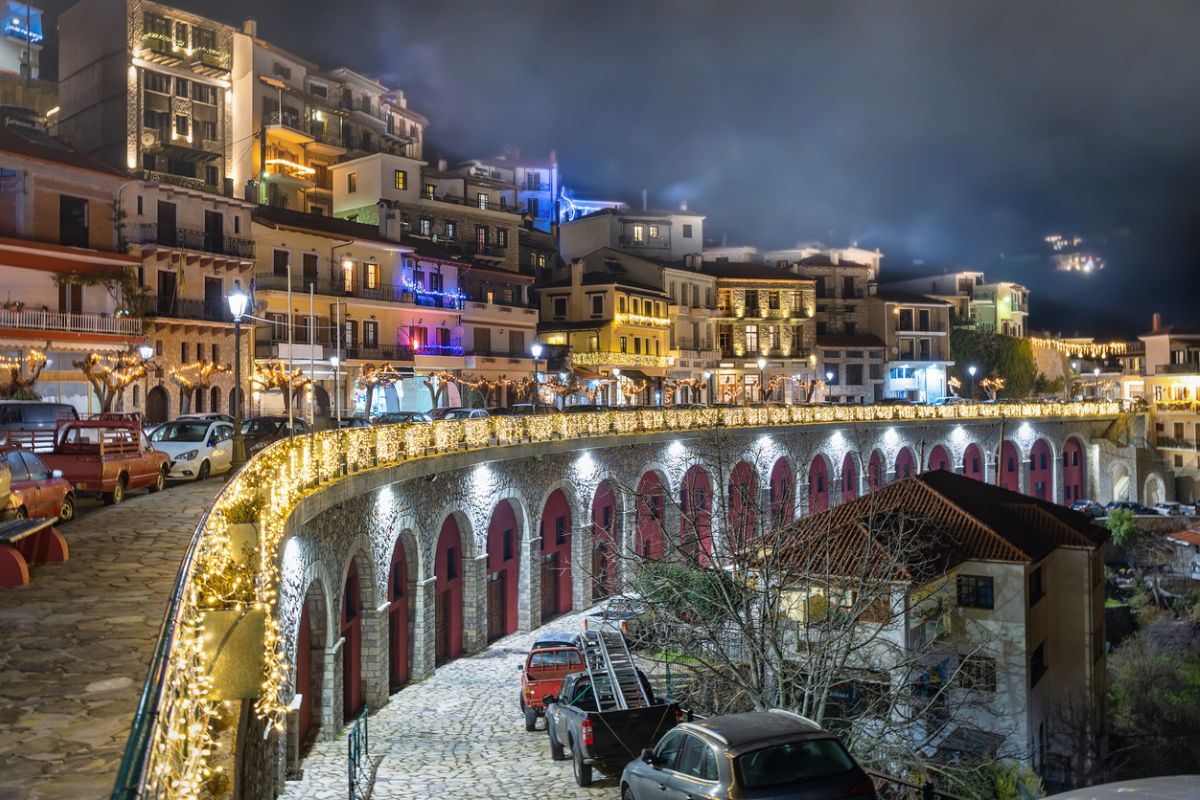
Celebrating Christmas in Greece: Things to Do and Places to Visit
From lively city events to lovely village getaways, Greece has many choices for people who want to enjoy the joy of Christmas. If you like busy city life, Athens is a great place to start. You can check out its wonderful Christmas markets, admire the bright lights on historic buildings, and feel the cheerful spirit all around you.
For a peaceful getaway, think about visiting beautiful towns like Nafplio or Arachova. These places have a nice mix of local celebrations, great winter views, and plenty of chances to enjoy the warm feel of the season.
Athens Lights Up: Christmas Markets and City Decorations
As the heart of Greece, Athens changes into a beautiful winter wonderland at Christmas. It attracts visitors with its charming feel. The city lights up with bright Christmas lights on its streets, squares, and old buildings. This creates a magical feel that is both lovely and welcoming.
One of the best things about Christmas in Athens is the lively Christmas markets. From Syntagma Square, the main area, to other parts of the city, these busy markets provide a great mix of tasty snacks, special gifts, and happy holiday spirit. You can look at stalls full of handmade decorations, try local foods like roasted chestnuts and warm spiced wine, and enjoy the joyful atmosphere all around you.
Take some time to explore the lovely streets of Athens after visiting the markets. You can enjoy the sparkling lights that brighten the Acropolis, making an amazing view. You can also walk in the beautiful area of Plaka, where you will find traditional shops and tavernas that feel warm and welcoming.
Nafplio and Arachova: Winter Getaways in Greece
If you want a quiet break from the city noise, think about visiting beautiful towns like Nafplio or Arachova in Greece for a winter getaway. Nafplio is on the Peloponnese peninsula. Its charming old town, Venetian buildings, and romantic feel make it special. During the holiday season, it becomes a lovely Christmas village. You can walk across cobblestone streets with shiny lights, enjoy warm drinks in cozy cafes, and visit the town’s old fortresses that give great views of the winter scenery.
For those who want a mountain getaway, Arachova is a true winter wonderland. It sits on the slopes of Mount Parnassus. Arachova is known for its old stone houses and pretty squares. It is close to top ski resorts, and has a mix of fun activities and cheerful days. You can ski or snowboard down the snowy hills, relax with a hot chocolate by a warm fire, and feel the real charm of a Greek mountain village.
Whether you pick the romantic feel of Nafplio or the snowy beauty of Arachova, these winter trips in Greece promise a Christmas that you will never forget. You will enjoy the charm, beauty, and warmth of the Greek people.
Epiphany in Greece: A January Celebration You Shouldn’t Miss
While Christmas celebrations might be ending in many places, Greece keeps the joy going in January with Epiphany. Epiphany is an important religious holiday celebrated on January 6th. It remembers the baptism of Jesus in the Jordan River and is very meaningful for Greek Christians.
One of the most interesting traditions connected to Epiphany in Greece is the “Blessing of the Waters” ceremony. This special ritual usually happens near water, like the sea, rivers, or lakes. A priest throws a cross into the water. Young men then jump into the cold water to get the cross. The person who returns it to the priest is thought to be lucky for the whole year.
Epiphany celebrations go on all day with big meals, family gatherings, and a happy feel that keeps the Christmas joy alive. Taking part in this special celebration lets you feel the deep religious customs of Greece and enjoy a truly great event that happens in January.
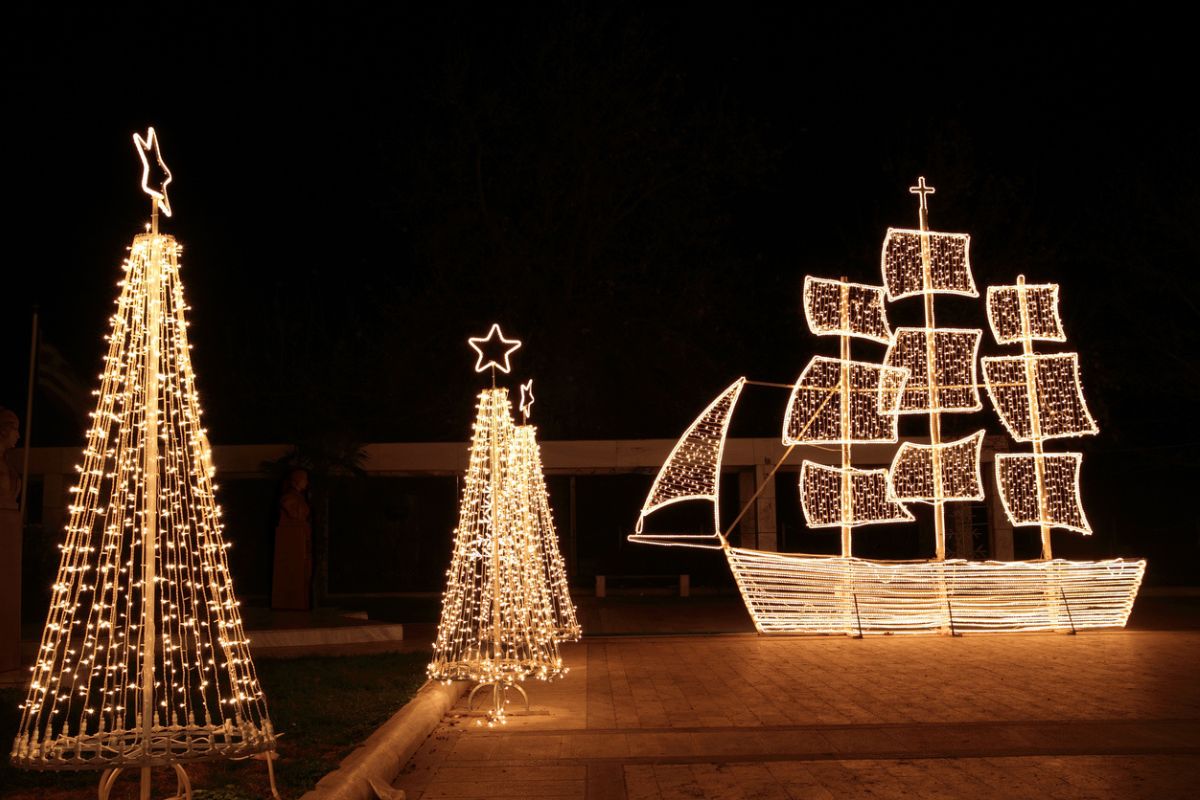
Greek Christmas Decorations and Symbols
Christmas decorations in Greece are more than just Christmas trees and bright lights. While these are popular now, there are also traditional symbols like the Karavaki boat. People also use natural items like olive branches and pomegranates. These decorations bring a special feel to the holiday season. They show Greece’s rich history, culture, and the meanings connected to this time of year.
From the careful details of a Karavaki to the bright red colors of pomegranates that stand for good luck and wealth, each decoration shares a story. They bring a piece of Greek tradition to Christmas celebrations. Looking into these special symbols helps us understand the meaning of Christmas in Greece better.
To Karavaki: Sailing into the Holiday Spirit
Among the many beautiful Christmas decorations in Greece, the Karavaki stands out. This is a traditional wooden boat that has lovely decorations. It represents the country’s strong connection to the sea and the holiday spirit. The Karavaki is often lit up with bright lights. It can have ornaments and sometimes even tiny sailors or a figure of Saint Nicholas steering the boat. The Karavaki is a sign of hope, good luck, and the safe return of family and friends.
In a country closely tied to the sea, it is not surprising that the Karavaki has become a big part of Christmas traditions in Greece. This special decoration reminds people of how important seafaring is in Greek culture. It also shows the hope that those out at sea will come back home safely for the holidays.
Whether it is shown in homes, stores, or public squares, the Karavaki brings feelings of tradition, warmth, and the magic of Christmas. It reminds everyone of the lasting bond between Greek people and the sea.
The Christmas Wreath
The Christmas wreath is important in Greek homes. It brings joy and good luck. Many families hang it on their doors. It is usually made of fresh greens, like pine or cedar. The wreath is a symbol of love and family. It also shows a tradition that lasts for many years. In Greece, people believe that it helps protect their home and brings happiness. This simple decoration is a big part of their holiday spirit.
The smell of fresh pine needles and the view of beautiful Christmas wreaths on front doors are common in many places during the holiday season, and Greece is one of them. In Greek homes, the Christmas wreath is special. It stands for the circle of life, lasting love, and bringing good luck into the home.
Greek Christmas wreaths are often made by hand with love. They usually have a base made of evergreen branches. This shows lasting life and good rewards. These wreaths are then decorated with different items, like pinecones, dried fruits, ribbons, and small ornaments. Each decoration brings its own feel and meaning to the whole wreath.
The Christmas wreath hangs on the front door. It welcomes guests and invites them to feel the warmth and joy of the holiday season. This simple decoration brings a bit of cheer to Greek homes. It reminds everyone of the beauty and meaning of this special time of year.
Smashing the Pomegranate
In Greek culture, the pomegranate stands out with its bright red color and many seeds. It means things like fertility, prosperity, and good luck. However, t is not surprising that this special fruit is important in New Year’s celebrations in Greece. It brings tradition and joy to the party.
One of the most interesting customs with pomegranates is the practice of smashing them on the ground for good luck. Just before midnight on New Year’s Eve, families come together outside their homes. The head of the household throws a pomegranate hard onto the ground. They hope it will break open and spread its seeds far and wide.
This act is seen as a way to bring good luck, wealth, and plenty for the new year. The more seeds you scatter, the more good fortune is thought to come to your family. It’s a happy tradition that adds fun and hope to New Year’s celebrations in Greece.
The Front Door Onion
Amid the cheerful decorations and happy traditions of Christmas and New Year’s in Greece, hanging an onion on the front door might look strange at first. Yet, this simple vegetable has a strong meaning. It stands for new beginnings, growth, and the hope for a good year ahead.
On New Year’s Eve, families in some areas of Greece hang an onion on their front doors. They often decorate it with ribbons or other elements. This practice comes from the fact that onions can sprout even in tough conditions. It stands for strength, determination, and the hope of new beginnings.
As the new year starts, the onion reminds us of growth, success, and good luck. It shows our strong belief in new beginnings and the hope for a better future that comes with a new year.
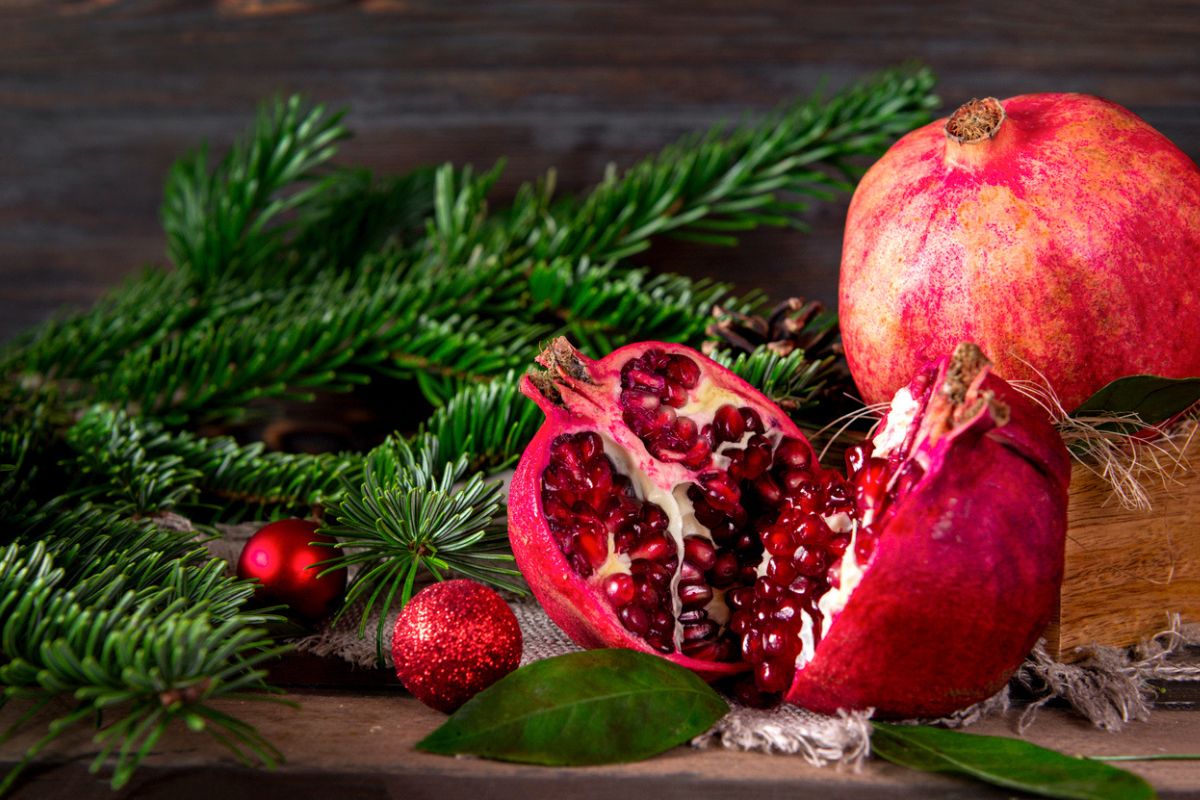
Learning Greek Holiday Greetings
One great thing about celebrating Christmas in Greece is enjoying the local language and traditions. Learning some Greek holiday greetings helps you connect with the locals. It adds a special feel to your festive greetings. Start by saying “Καλά Χριστούγεννα” (Kala Christougenna), which means “Merry Christmas.” Also, wish them a great new year with “Ευτυχισμένο το Νέο Έτος” (Eftihismeno to Neo Etos), meaning “Happy New Year.”
Don’t worry about trying these greetings. A simple effort will bring smiles and thanks. It shows respect for the culture and is a good way to enjoy the holiday spirit while sharing joy.
How to Say “Merry Christmas” in Greek
As you get involved in the cheerful feel of a Greek Christmas, saying “Merry Christmas” to your friends and family in Greek is a nice way to spread the joy of the season. It also shows that you appreciate Greek culture. The most popular way to share this warm wish is by using the phrase “Καλά Χριστούγεννα” (pronounced “Kala Christougenna”).
“Kala” means “good” or “well.” It shows wishes for a happy and joyful Christmas. “Christougenna” refers to the holiday and means “Christ’s Birth.” Together, these words express the meaning of the season. They highlight the need to celebrate the birth of Christ and wish happiness and good health to everyone around you.
As you spend time with family and friends, give gifts, and enjoy tasty meals, pause for a moment to share the joy of the season. You can say “Kala Christougenna.” This simple phrase shows how much you value Greek traditions and the spirit of Christmas.
New Year and Epiphany Greetings in Greek
As the joy of Christmas moves into the hope of a new year, the chance to share warm wishes and cheerful greetings stays alive in Greece. Once the clock hits midnight on New Year’s Eve, it’s time to lift a glass and tell everyone around you “Ευτυχισμένο το Νέο Έτος” (Eftihismeno to Neo Etos), which means “Happy New Year.” This greeting shows wishes for a happy, successful, and satisfying year to come.
And as the Christmas cheer stays, don’t forget about Epiphany. It is celebrated on January 6th and marks the end of the twelve days of Christmas. On this special day, you remember the baptism of Jesus. You can say “Χρόνια Πολλά” (Chronia Polla) to people. This phrase means “Many Years” and can be used for many celebrations, like birthdays and name days.
From the busy streets of Athens to the sunny Greek Islands, learning and using these greetings is a great way to meet the locals. You can share in their customs and feel the real spirit of the holiday season in Greece.
Celebrate Christmas in Greece by enjoying the rich traditions and joys the country offers. From the lovely carols of Kalanda to special decorations like Karavaki, Greece shows the feel of Christmas. Treat yourself to Christopsomo, Melomakarona, and Kourabiedes to taste the season’s flavors. Visit the lively markets in Athens, warm winter spots in Nafplio and Arachova, and celebrate the happy gatherings of Epiphany. Join in the Greek holiday greetings and feel the warmth of their Christmas traditions. Merry Christmas – Kala Christougenna!
Feeling Ready?
From our blog
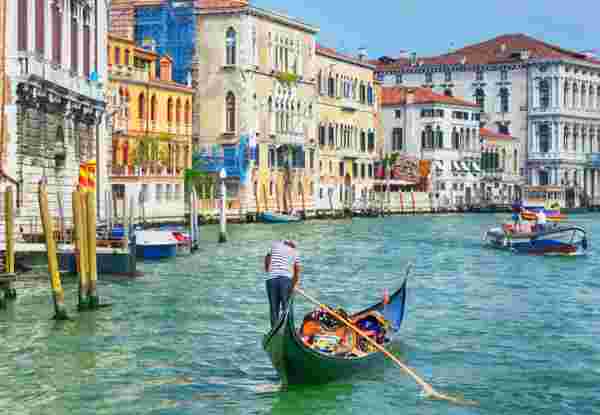
Exploring Venice and Its Canals
READ MORE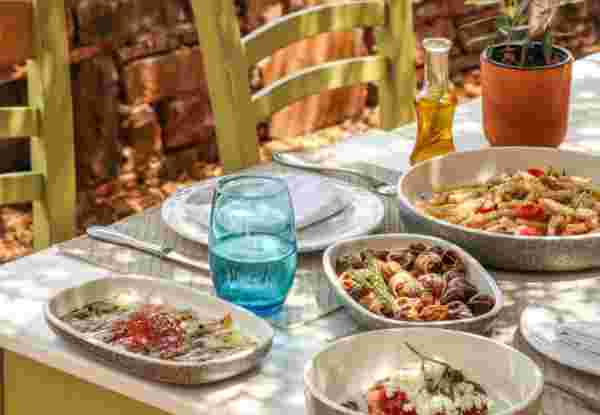
Crete for Seniors: A Complete Guide
READ MORE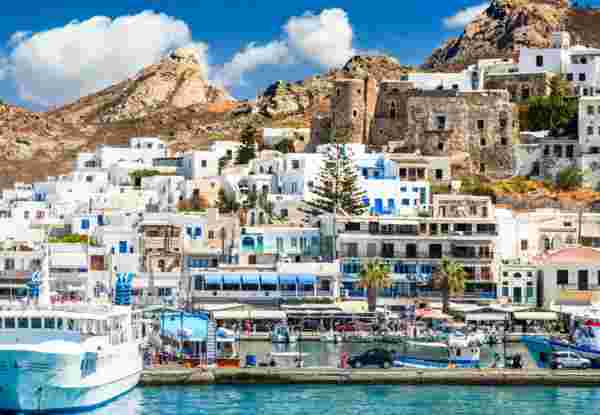
How to Explore Naxos for Seniors
READ MORE
Why Visit Santorini with Kids: A Fun Family Guide
READ MORE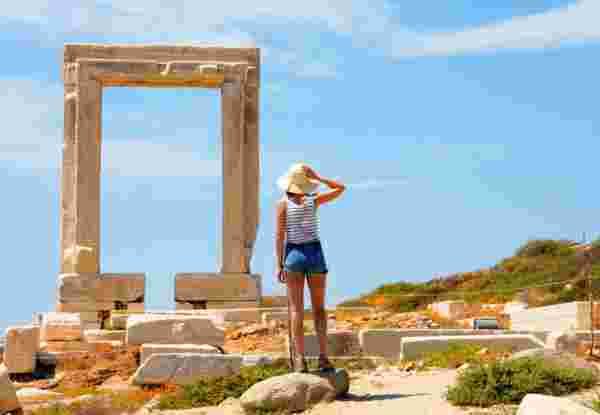
Honeymoon in Naxos: A Complete Guide
READ MORE
Visiting Athens with Kids: A helpful Guide
READ MORE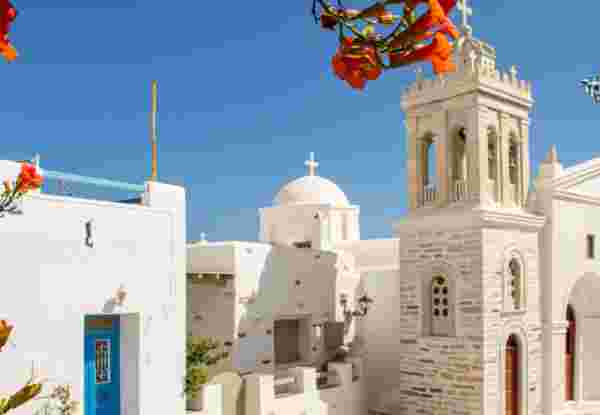
Paros for Seniors: Tips and Itinerary
READ MORE
Best Resorts in Greece for Families: Your Ultimate 2025 Guide
READ MORE
How to Enjoy Santorini for Seniors
READ MORE